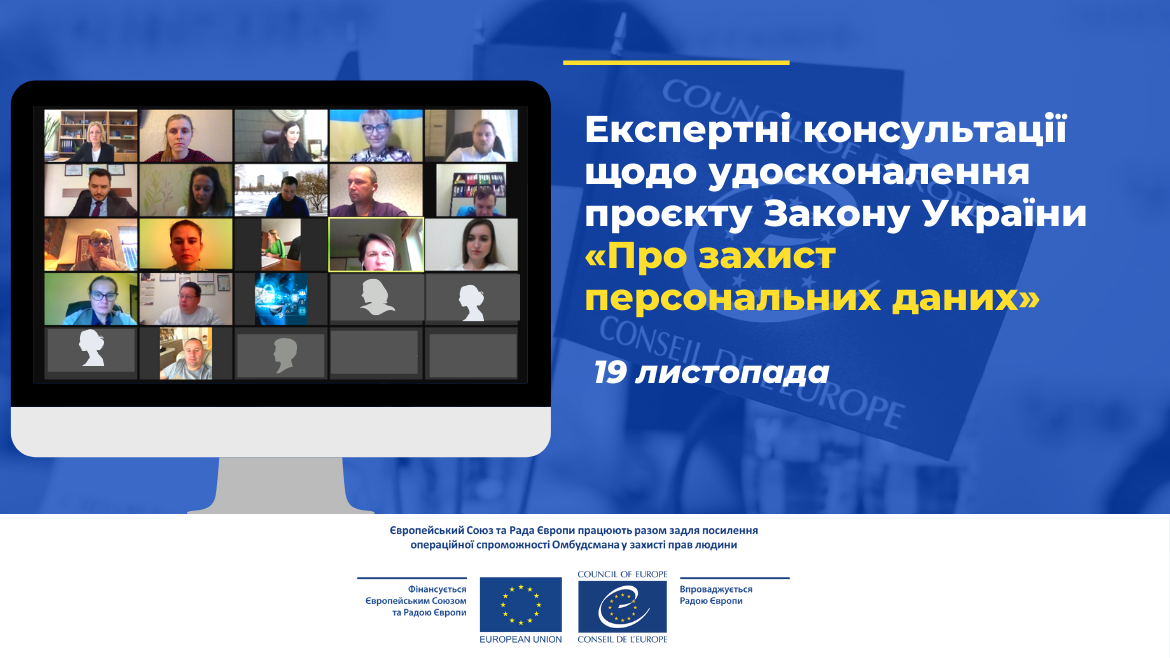19 November 2020. Expert consultations on the improvement of the Draft Law of Ukraine “On Personal Data Protection” developed by the joint working group of two Parliament Committees and the Office of the Ukrainian Parliament Commissioner for Human Rights took place.
The Draft Law, when adopted, will serve as a basis for the protection of personal data both in public and private sector, as well as for state bodies activity when adopting legal acts regulating personal data processing and security.
The discussion was held on the initiative of the Ukrainian Parliament Committee on Human Rights, Deoccupation and Reintegration of Temporarily Occupied Territories in Donetsk, Luhansk Regions and Autonomous Republic of Crimea, National Minorities and Interethnic Relations and the Ukrainian Parliament Committee on Digital Transformation with the support of Joint Project “European Union and the Council of Europe working together to strengthen the Ombudsperson’s capacity to protect human rights”.
The purpose of the discussion was to agree on the positions of stakeholders and take into account the recommendations of international experts in order to develop an effective and up-to-date bill on personal data protection that would meet the requirements of Convention 108+ and Regulation (EU) 2016/679 of the European Parliament and the Council 2016/679 (GDPR).
During the event, Nataša Pirc Musar and Dijana Šinkūnienė, experts of the project "European Union and the Council of Europe working together to strengthen the Ombudsperson’s capacity to protect human rights" presented the legal review of the Draft Law of Ukraine “On Personal Data Protection”.
In particular, experts considered the Draft Law on the compliance of its provisions with the standards of personal data protection of the Council of Europe and the EU.
The authors of the analysis noted: “This report provides comments by Article of the Draft Law, however, we would like to stress that in order to make concrete recommendations and to have good quality legislation it is very important to respect the general purpose of the amendments and to evaluate their impact on the rights and freedoms of individuals as well on the free movement of personal data”.
Nataša Pirc Musar and Dijana Šinkūnienė having analyzed the Draft Law advice to:
- avoid provisions of the Draft Law that are overly complicated and even impossible to implement into practice, as they would not bring any value for the protection of the rights and freedoms of individuals;
- set up the obligation for the state institutions to include into the pieces of legislation regulating personal data processing the purpose of the processing at stake and, as the case may be, other related information;
- foresee procedure of the data protection impact assessment in the course of adoption of the legal act;
- lay down the main principles relating to personal data processing by public authorities;
- recognize in the Draft Law applicability of mechanisms by Ukrainian data controllers and data processors, in compliance with Article 10 of Convention 108+;
- foresee provisions of the establishment of the independent supervisory authority with regard to proper enforcement of the data protection legislation.
The participants of the event paid special attention to Article 15 of the Draft Law, which deals with the processing of personal data for the purposes of journalistic or creative activities. According to international experts, the article contains rather strict requirements.
In particular, if we talk about the principle of data accuracy, then journalistic work, even more perhaps artistic expression, by the nature of things also includes comments, opinions, value judgements, in which it is not possible to establish or demand the accuracy of data in terms of personal data protection.
In addition, compliance with the principle of limitation of data storage is also questionable, since journalistic and artistic work involves inclusion in a journalistic article, which can have a long lifespan, which is even longer in case of a novel, a poem, etc. Therefore, in this situation it is recommended to adapt these principles.
The participants of the discussion agreed to continue work on improving the bill and processing the comments and suggestions voiced within the joint working group of the Parliament Committees and the Ombudsperson's Office.
The European Union and Council of Europe Joint Project “EU and Council of Europe working together to strengthen the Ombudsperson’s capacity to protect human rights” aimed at ensuring better protection of human rights in Ukraine and enhancing operational capacities of the Ombudsperson’s Office in particular in the area of ensuring the protection of the right to privacy and personal data.






